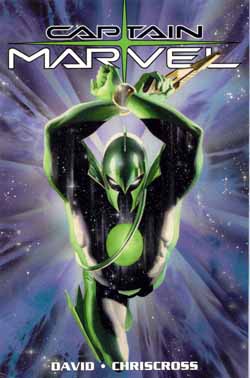 Â
Â
By Peter David, ChrissCross, Ivan Reis & Paco Medina (Marvel Comics)
ISBN 0-7851-1104-2
This particular incarnation of the “trademark-that-must-not-die†features the son of the Kree warrior who was Marvel’s first holder of the name (after the copyright on a character held now by DC, but originally taken out by Fawcett in 1940 finally lapsed in 1968) and long-time company supporting character Rick Jones in a symbiotic relationship that echoes the heyday of those flower-power glory days. Fair warning though, despite the excellent writing and great art, if you are not at least passingly familiar with Marvel’s close continuity, this is not a series of books you want to read.
Nothing to Lose (reprinting Captain Marvel: volume 4, issues #1-6 and I told you it was confusing didn’t I?) is the story of Genis, the test-tube baby son of Mar-Vell, an alien warrior who saved the Earth and the Universe countless times before dying of cancer in the landmark Death of Captain Marvel, the company’s first ever Graphic Novel.
Artificially matured, Genis tried to emulate his father as a galaxy-spanning crusader, with mixed results, before hooking up with Rick Jones – his Dad’s original sidekick who offered the promise of real, insider insights into what made him such a hero.
When Nothing to Lose opens he is in fact, in just the same situation his father endured with the teen-aged Jones back in 1960’s. Their bodies are linked by “Nega-bandsâ€, which are fantastically powerful alien wrist-bands, which both wear, but sadly only in turns, as they have the drawback of merging their molecular structure. This means that only one body can inhabit our universe at once, and the other is trapped in a sub-atomic pocket-universe called The Microverse, from where they can observe and communicate, but not affect us here.
Marvel also has his father’s greatest power, “Cosmic Awareness†an ability to discern everything happening everywhere at once. Sadly, and inevitably, this ability is turning Genis into a raving madman. Just knowing something bad is happening doesn’t mean that the only solution you can offer is ultimately the right one for the universe. This is tragically demonstrated when Captain Marvel stops a suicide bomber from detonating, only to see her murdered by one of her intended victims. This hopeless situation is repeated and magnified by their intervention in an alien invasion and other missions.
As the days progress Rick has to face the fact that his partner’s omniscience is more curse than blessing, and an increasing capriciousness is affecting Captain Marvel’s desire to “Do Goodâ€. When the cosmic avenger starts taking advice from the Punisher, joins the militaristic Kree’s colonial space fleet and even kills himself (successfully but apparently not permanently) he decides that his destiny is to destroy creation, and it leads to a confrontation with a number of the universe’s most powerful conceptual entities before a new status quo can be reached.
Peter David’s blackly tongue-in-cheek examination of power and perspective has some truly chilling moments, and has a lot to say on the nature of heroism, all leavened by his absurdist sensibilities and love of comedy word-play. It is such a shame that there’s so much baggage to attend to before the casual reader can even approach it.
© 2002, 2003 Marvel Characters, Inc. All Rights Reserved.
